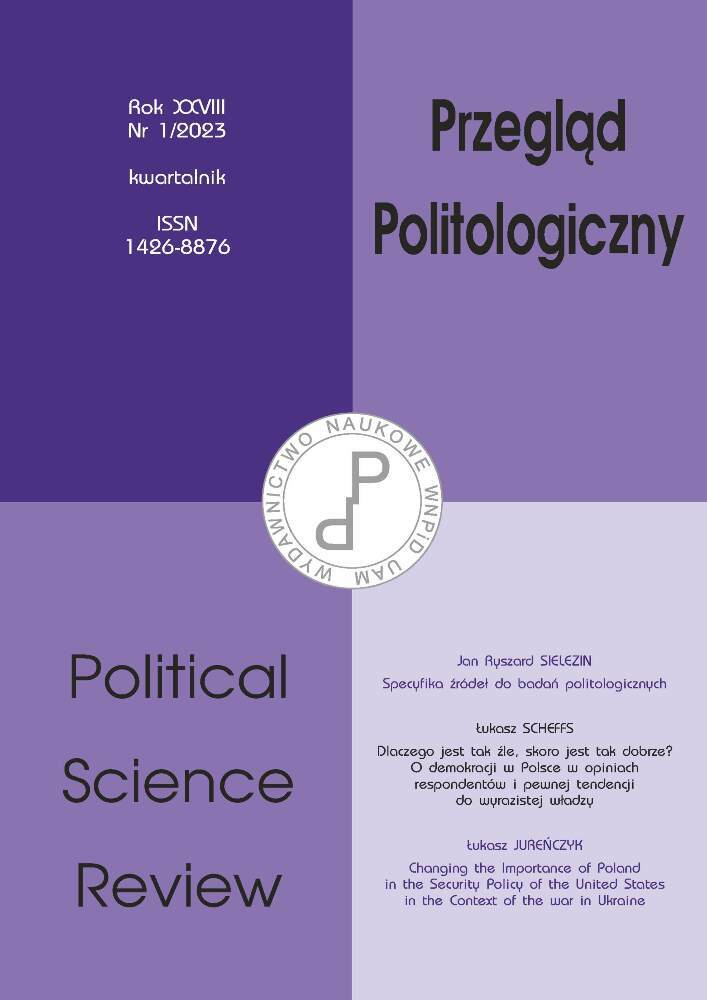Abstract
This article’s main purpose is to empirically analyze the importance of digitalization in the agenda of the Group of Twenty (G20). The starting point is observation based on quantitative and qualitative analysis of documents and interviews with experts, according to which this issue – initially bound to the economic domain and treated marginally by the G20 – gained importance during the presidency of the Group held by China (2016) and Germany (2017). By breaking off from tutelage of economics between 2016 and 2019, digitalization became a priority in the interstate deliberation space and basis for the vision of “interconnected world” promoted by the G20, based on adopting a broad approach to transformations in cyberspace and allowing for linking of economic and financial issues with development policy, security, and protection of civil rights.
References
Arntz M., Gregory T., Zierahn U. (2016), The Risk of Automation for Jobs in OECD Countries: A Comparative Analysis, “OECD Social, Employment and Migration Working Papers”, nr 189, OECD Publishing.
Åslund A. (2009), The Group of 20 must be stopped, „Financial Times”, https://www.ft.com/content/37deaeb4-dad0-11de-933d-00144feabdc0, 10.05.2022.
Baldwin R. (2016), The Great Convergence. Information Technology and the New Globalization, Belknap Press of Harvard University Press, Cambridge. DOI: https://doi.org/10.2307/j.ctv24w655w
Bell D. (1980), The social framework of the information society, w: The Microelectronics Revolution: The Complete Guide to the New Technology and Its Impact on Society, red. T. Forester, Basil Blackwell, Oxford.
Bell D. (1976), The Coming of Post-Industrial Society: A Venture In Social Forecasting, Basic Book, New York.
Bell D. (1999), The Coming of Post-Industrial Society: A Venture in Social Forecasting Reissue Edition, Basic Book, New York.
Bell D. (1989), The third technological revolution and its possible socioeconomic consequences, “Dissent”, vol. 36, nr 2.
Brynjolfsson E., McAfee A. (2011), Race Against the Machine: How the Digital Revolution is Accelerating Innovation, Driving Productivity, and Irreversibly Transforming Employment and the Economy, Digital Frontier Press, Lexington, Massachusetts.
Dahlman C., Mealy S., Wermelinger M. (2016), Harnessing the Digital Economy for Developing Countries, “OECD Development Centre Working Papers”, nr 334, OECD Publishing.
Dobrowolski Z. (2005), Koncepcja społeczeństwa informacyjnego Daniela Bella, w: Od informacji naukowej do technologii społeczeństwa informacyjnego, red. B. Sosińska-Kalata, M. Przastek-Samokowa, A. Skrzypczak, Warszawa.
Duff A. S. (1998), Daniel Bell’s theory of the information society, “Journal of Information Science”, vol. 24, issue 6. DOI: https://doi.org/10.1177/016555159802400601
Floridi L. (2020), The Fight for Digital Sovereignty: What It Is, and Why It Matters, Especially for the EU, “Philosophy & Technology”, vol. 33. DOI: https://doi.org/10.1007/s13347-020-00423-6
G20 (2011), G20 Cannes Action Plan for Growth and Jobs, Cannes, 4.11.2011, http://www.g20.utoronto.ca/2011/2011-cannes-action-111104-en.html, 10.06.2022.
G20 (2013a), G20 Leaders declaration, St. Petersburg, http://www.g20.utoronto.ca/2013/2013-0906-declaration.html, 10.06.2022.
G20 (2013b), Tax Annex to the Saint Petersburg G20 Leaders Declaration, 5.09.2013, St Petersburg, ACTION 1 – Address the Tax Challenges of the Digital Economy, http://www.g20.utoronto.ca/2013/2013-0905-tax.html, 10.06.2022.
G20 (2015), G20 Leaders’ Communiqué Antalya Summit, 15–16.11.2015, http://www.g20.utoronto.ca/2015/151116-communique.html, 10.06.2022.
G20 (2016a), G20 Digital Economy Development and Cooperation Initiative, Hangzhou Summit, Hangzhou, 5.09.2016, http://www.g20.utoronto.ca/2016/160905-digital.html, 21.06.2022.
G20 (2016b), G20 Blueprint on Innovative Growth, 2016 Hangzhou Summit, Hangzhou, 5.09.2016, http://www.g20.utoronto.ca/2016/160905-blueprint.html, 21.06.2022.
G20 (2017), G20 Leaders’ Declaration: Shaping an Interconnected World, 8.07.2017, http://www.g20.utoronto.ca/2017/2017-G20-leaders-declaration.html, 26.06.2022.
G20 (2018), G20 Digital Economy Ministerial Declaration, Salta, Argentina, 24.08.2018, https://g20digitalrepo.org/G20%20DETF%20Ministerial%20Declaration%20Salta.pdf, 2.07.2022.
G20 (2019a), G20 Osaka Leaders’ Statement on Preventing Exploitation of the Internet for Terrorism and Violent Extremism Conducive to Terrorism (VECT), Osaka, Japan, 29.06.2019.
G20 (2019b), Osaka Declaration on Digital Economy, Osaka, Japan, 29.06.2019.
G20 Research Group (2022), http://www.g20.utoronto.ca/summits/index.html, 10.06.2022. DOI: https://doi.org/10.1787/4f39e418-en
Gilman M. (2018), Divergent Performance and Shifting Alliances in a Deglobalizing World, “International Organisations Research Journal”, vol. 13, nr 2. DOI: https://doi.org/10.17323/1996-7845-2018-02-01
Kirton J. J. (2013), G20 Governance for a Globalized World, Ashgate, Farnham.
Kirton J. J., Kokotsis E. (2015), The Global Governance of Climate Change, Ashgate, Farnham. DOI: https://doi.org/10.4324/9781315557625
Manyika J., Lund S., Bughin J., Woetzel J., Stamenov K., Dhingra D. (2016), Digital Globalization: The New Era of Global Flows, McKinsey Global Institute, London.
Martin P. (2013), The G20: From Global Crisis Responder to Steering Committee, w: The Oxford Handbook of Modern Diplomacy, red. A. F. Cooper, J. Heine, R. Thakur, Oxford. DOI: https://doi.org/10.1093/oxfordhb/9780199588862.013.0041
Motala M. (2020), G20 Performance on International Taxation. G20 Japan: The 2019 Osaka Summit, “G20 Insights”, https://www.g20-insights.org/policy_briefs/g20-performance-japan-international-taxation/, 10.05.2022.
Nye Jr. J. S. (2020), China and America Are Failing the Pandemic Test, Project Syndicate, 2 IV 2020, https://www.project-syndicate.org/commentary/china-america-failing-pandemic-test-by-joseph-s-nye-2020-04, 10.05.2022.
OECD (1980), Recommendation of the Council Concerning Guidelines Governing the Protection of Privacy and Transborder Flows of Personal Data, https://legalinstruments.oecd.org/en/instruments/OECD-LEGAL-0188, 10.06.2022.
OECD (1985), Declaration on Transborder Data Flows, https://legalinstruments.oecd.org/en/instruments/OECD-LEGAL-0216, 10.06.2022.
OECD (2007), Recommendation of the Council on Cross-Border Co-Operation in the Enforcement of Laws Protecting Privacy, https://legalinstruments.oecd.org/en/instruments/OECD-LEGAL-0352, 10.06.2022.
OECD (2013), Recommendation of the Council Concerning Guidelines Governing the Protection of Privacy and Transborder Flows of Personal Data, https://www.oecd.org/sti/ieconomy/2013-oecd-privacy-guidelines.pdf, 10.06.2022.
OECD (2017), Key issues for digital transformation in the G20, Report prepared for a joint G20 German Presidency/OECD conference, Berlin, Germany, 12 January 2017.
OECD (2018), Bridging the digital gender divide. Include, upskill, innovate, Paris.
OECD (2019a), Recommendation of the Council on Artificial Intelligence, https://legalinstruments.oecd.org/en/instruments/OECDLEGAL-0449, 10.06.2022.
OECD (2019b), Recommendation of the Council on Health Data Governance, https://legalinstruments.oecd.org/en/instruments/OECDLEGAL-0433, 10.06.2022.
OECD (2020), Tax Challenges Arising from Digitalisation – Economic Impact Assessment, https://www.oecd.org/tax/beps/tax-challenges-arising-from-digitalisation-economic-impact-assessment-0e3cc2d4-en.htm, 10.06.2022.
Pisani-Ferry J (2019), Collective Action in a Fragmented World, “Policy Brief” 2019, issue 5, https://legalinstruments.oecd.org/en/instruments/OECD-LEGAL-0188, 10.05.2022.
Rewizorski M. (2016), A partnership of convenience. The OECD and the G20 as control rooms for global policy, “Yearbook of the Institute of East-Central Europe”, vol. 14, no. 4.
Schirm S. (2010), Leaders in Need of Followers: Emerging Powers in Global Governance, “European Journal of International Relations”, vol.16, issue 2. DOI: https://doi.org/10.1177/1354066109342922
Schwab K. (2016), The Fourth Industrial Revolution, World Economic Forum, Geneva.
Śledziewska K., Włoch R. (2020), Gospodarka Cyfrowa. Jak nowe technologie zmieniają świat, Wydawnictwo Uniwersytetu Warszawskiego, Warszawa. DOI: https://doi.org/10.31338/uw.9788323541943
Tyson A., Maniam S. (2016), Behind Trump’s Victory: Divisions by Race, Gender, Education, Pew Research Centre, https://www.pewresearch.org/fact-tank/2016/11/09/behind-trumps-victory-divisions-by-race-gender-education/, 26.06.2022.
UNCTAD (2018), G20 deepens support for digital inclusion, https://unctad.org/es/node/1904, 2.07.2022.
Waters M. (1996), Daniel Bell, Routledge, London.
License
Copyright (c) 2023 Marek Rewizorski

This work is licensed under a Creative Commons Attribution-ShareAlike 4.0 International License.

